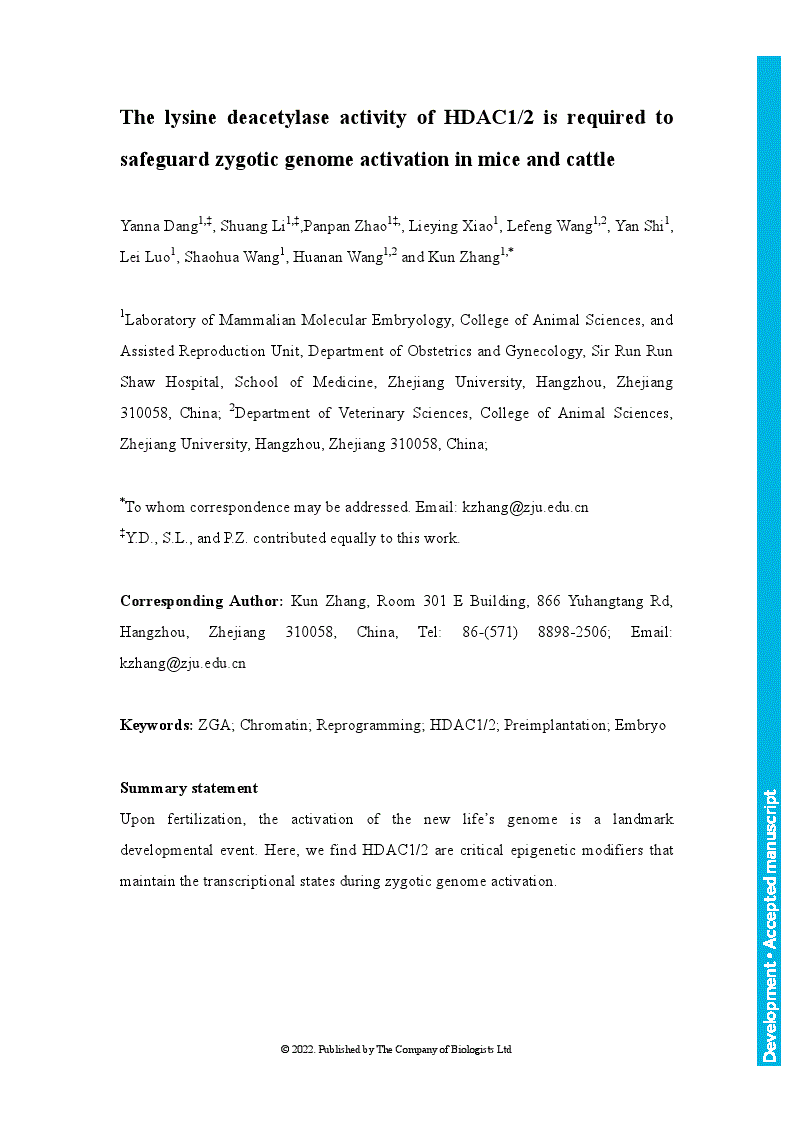The genome is transcriptionally inert at fertilization and must be activated through a remarkable developmental process called zygotic genome activation (ZGA). Epigenetic reprogramming contributes significantly to the dynamic gene expression during ZGA, however the mechanism has yet to be resolved. Here, we find histone deacetylase 1 and 2 (HDAC1/2) can regulate ZGA through the lysine deacetylase activity. Notably, in mouse embryos, overexpression of HDAC1/2 dominant negative mutant leads to a developmental arrest at 2-cell stage. RNA-seq reveals that 64% of down-regulated genes are ZGA genes and 49% of up-regulated genes are developmental genes. Inhibition of the deacetylase activity of HDAC1/2 causes a failure of histone deacetylation at multiple sites including H4K5, H4K16, H3K14, H3K18, and H3K27. ChIP-seq analysis exhibits an increase and decrease of H3K27ac enrichment at promoters of up- and down-regulated genes, respectively. Moreover, HDAC1 mutants prohibited the removal of H3K4me3 via impeding KDM5s. Importantly, the developmental block can be greatly rescued through Kdm5b injection and expression of the majority of dysregulated genes partially corrected. Similar functional significance of HDAC1/2 is conserved in cattle embryos. Overall, we propose that HDAC1/2 is indispensable for ZGA via creating correct transcriptional repressive and active states in mouse and bovine embryos.
The lysine deacetylase activity of HDAC1/2 is required to safeguard zygotic genome activation in mice and cattle
These authors contributed equally to the work
- Award Group:
- Funder(s): National Natural Science Foundation of China
- Award Id(s): 31672416
- Funder(s):
- Award Group:
- Funder(s): Zhejiang Provincial Natural Science Foundation
- Award Id(s): LZ21C170001
- Funder(s):
- Award Group:
- Funder(s): China Postdoctoral Science Foundation
- Award Id(s): 2020M671742
- Funder(s):
Currently Viewing Accepted Manuscript - Newer Version Available
Yanna Dang, Shuang Li, Panpan Zhao, Lieying Xiao, Lefeng Wang, Yan Shi, Lei Luo, Shaohua Wang, Huanan Wang, Kun Zhang; The lysine deacetylase activity of HDAC1/2 is required to safeguard zygotic genome activation in mice and cattle. Development 2022; dev.200854. doi: https://doi.org/10.1242/dev.200854
Download citation file:
Advertisement
Call for papers: Uncovering Developmental Diversity

Development invites you to submit your latest research to our upcoming special issue: Uncovering Developmental Diversity. This issue will be coordinated by our academic Editor Cassandra Extavour (Harvard University, USA) alongside two Guest Editors: Liam Dolan (Gregor Mendel Institute of Molecular Plant Biology, Austria) and Karen Sears (University of California Los Angeles, USA).
Choose Development in 2024

In this Editorial, Development Editor-in-Chief James Briscoe and Executive Editor Katherine Brown explain how you support your community by publishing in Development and how the journal champions serious science, community connections and progressive publishing.
Journal Meeting: From Stem Cells to Human Development

Register now for the 2024 Development Journal Meeting From Stem Cells to Human Development. Early-bird registration deadline: 3 May. Abstract submission deadline: 21 June.
Pluripotency of a founding field: rebranding developmental biology

This collaborative Perspective, the result of a workshop held in 2023, proposes a set of community actions to increase the visibility of the developmental biology field. The authors make recommendations for new funding streams, frameworks for collaborations and mechanisms by which members of the community can promote themselves and their research.
Read & Publish Open Access publishing: what authors say

We have had great feedback from authors who have benefitted from our Read & Publish agreement with their institution and have been able to publish Open Access with us without paying an APC. Read what they had to say.



